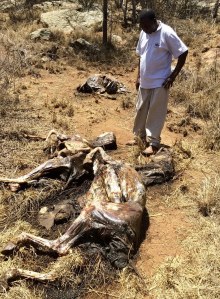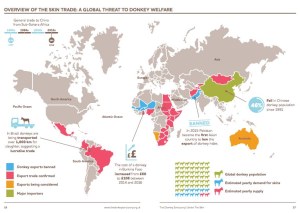Story by Sarah V Schweig as published on The Dodo
Warning: Graphic Content – What they’re used for is such a waste

Marjorie Farabee, Director of Wild Burro affairs at WHFF, and her good friend Miss Abby ~ photo by Terry Fitch
For centuries, in rural cultures across the globe, one animal has been an important part of the family, helping to keep farms and villages running.
Not only do millions of people depend on donkeys for practical purposes — many donkeys are seen more and more as smart and loyal pets.
But this friendship between people and donkeys is increasingly threatened by a growing trade in something you’ve probably never even heard of: “ejiao,” (also known as “colla corii asini” or “donkey hide glue”) a kind of gelatin made from donkey skin — and demand for ejiao is killing literally millions of donkeys per year.
A new report from The Donkey Sanctuary in the U.K. shows just how massive this emerging global trade really is. At least 1.8 million donkey skins are being traded each year — but it could be between 4 million and 10 million. The trade is difficult to track and until now hasn’t been studied at such a large scale.
“Our report reveals the shocking scale of this global trade and how it’s causing a chain of welfare issues for the donkeys at every step, from sourcing to transport and finally to slaughter,” Mike Baker, chief executive of The Donkey Sanctuary, told The Dodo in a statement.
“Ejiao is a medicine with ancient roots and has been promoted as a product worthy of emperors,” the report says, explaining that traditional herbalists in China claim that ejiao can increase libido, slow aging and prevent disease. But ejiao has not been recognized as having medicinal properties by western medicine.
 This belief means that donkeys are becoming more valuable for their skins, and therefore harder for rural families to afford. Even the loyal donkeys families already have are at risk. It is becoming more common for donkeys to be stolen right out of a family’s yard and slaughtered for their skins.
This belief means that donkeys are becoming more valuable for their skins, and therefore harder for rural families to afford. Even the loyal donkeys families already have are at risk. It is becoming more common for donkeys to be stolen right out of a family’s yard and slaughtered for their skins.
While exports of donkey skins come from South America and Asia, the largest source is in Africa, where donkeys (many of them stolen) are rounded up in “donkey markets,” where they are often packed together and left without shelter from the hot sun and without food or water, while they await slaughter.
Often, after the skins are removed, the bodies of the donkeys are burned.
“The market is far worse than I expected,” said Alex Mayers, program manager at The Donkey Sanctuary, from a donkey market in Tanzania last week. “There are about 700 donkeys basically coming here to wait to die. There’s no food or water. The donkeys are very stressed. There are lots of signs of dehydration and hunger.”
But there is hope.
Some countries have already taken action and banned exports of donkey skins, making their donkeys much safer. This includes the African countries of Niger and Burkina Faso, and Pakistan, in Asia.
The Donkey Sanctuary is calling for a stop to the trade of donkey skins worldwide, so that the damage already done to donkey populations and the people who depend on them can be assessed.
 “In particular, we urge other countries affected by this trade to follow the lead taken by Burkina Faso and Niger and ban the slaughter and export of donkeys for their skins,” Suzi Cretney, public relations manager for The Donkey Sanctuary, told The Dodo.
“In particular, we urge other countries affected by this trade to follow the lead taken by Burkina Faso and Niger and ban the slaughter and export of donkeys for their skins,” Suzi Cretney, public relations manager for The Donkey Sanctuary, told The Dodo.
Cretney said that raising public awareness about where ejiao really comes from could help consumers make better choices.
“We are asking countries to follow the lead by Burkina Faso and Niger to end the slaughter and export of donkeys for their skins because it could help thousands, if not millions of donkeys — their welfare, and their real value supporting people’s livelihoods is at risk,” Baker said.
“This has to stop,” Mayers said, standing by a pen packed with donkeys awaiting their fate. “This absolutely just has to stop.”
To get action alerts about how you can help save these donkeys, join the campaign.
Click (HERE) for video and graphic photos!
https://www.thedodo.com/donkey-skin-trade-2230693220.html
Categories: Horse News, Horse Slaughter, Uncategorized, Wild Burros









Please, we must find a way to stop this immediately. No animal, especially the Donkey deserves this.
LikeLiked by 1 person
China Animal Welfare Legislation: Current Situation and Trends
From Analysis of Three Cases in Recent Years
The Animal Law Conference
October 16-18, 2015
Lewis & Clark Law School
Portland U.S.A
Song Wei
Professor and Director
Law Institute, University of Scienceand Technology of China
songwei@ustc.edu.cn
Click to access China-Animal-Welfare-Legislation.pdf
LikeLike
China announces ban on ivory trade by end of 2017
December 30 December 2016
China has announced a ban on all ivory trade and processing activities by the end of 2017.
Conservation groups hailed the decision as “historic” and a “game-changer” for the future of elephants.
The move follows a resolution at the Convention on International Trade in Endangered Species (Cites) in South Africa in October.
China has the biggest ivory market in the world – some estimates suggest 70% of the world’s trade ends up there.
The war on elephants
Why elephants are seeking refuge in Botswana
Ivory can reach $1,100 (£850) per kilogram in China.
‘Great leadership’
China’s State Council announced the details of the ban on Friday.
The commercial processing and sale of ivory will stop by 31 March, and all registered traders will then be phased out, bringing a full halt to the market by the end of the year.
Conservation group WWF welcomed the latest news, calling it a “historic announcement… signalling an end to the world’s primary legal ivory market and a major boost to international efforts to tackle the elephant poaching crisis in Africa”.
http://www.bbc.com/news/world-asia-china-38470861
LikeLiked by 1 person
GUARDIANS OF CHINESE ANIMAL PROTECTION
https://www.facebook.com/Guardians-of-Chinese-Animal-Protection-%E5%AE%88%E6%8A%A4%E8%80%85-1403089906658450/
LikeLiked by 1 person
Mental illness.
LikeLike
On the part of the chinese that’s for sure, I wish our government would stop picking on those in Russia, and put the blame for so much of our countries misery squarely where it belongs on china + no. Korea.
LikeLiked by 1 person